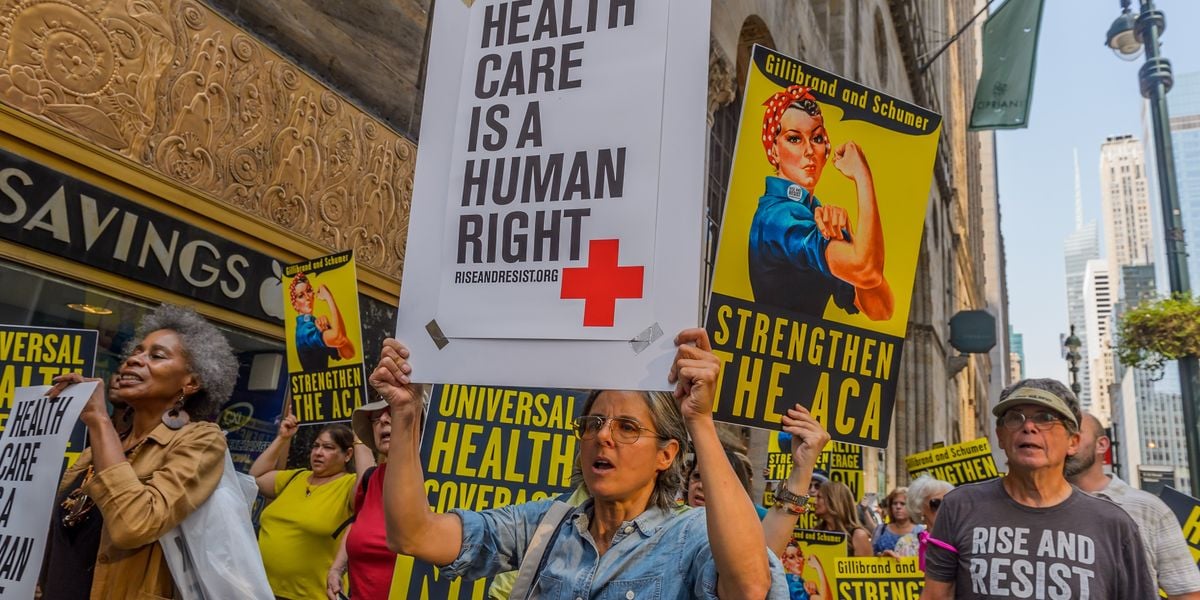Summary
A Gallup poll shows 62% of Americans believe the government should ensure universal healthcare coverage—the highest support in over a decade.
While Democratic backing remains strong at 90%, support among Republicans and Independents has also grown since 2020.
Public frustration with the for-profit healthcare system has intensified following the arrest of a suspect in the murder of UnitedHealthcare CEO Brian Thompson, reportedly motivated by anger at the industry.
Recent controversies, including Anthem’s rollback of anesthesia coverage cuts, and debates over Medicare privatization highlight ongoing dissatisfaction with the system.



Again, there’s that 30-40% Party Of No crowd that is likely the same starve the beast pro-Trump voters we’ve seen in polls time and again. The ones probably going to need those very same services, if they already aren’t using medicare/-aid.
That is why universal healthcare risk pools need to start at the state level. The goal needs to be to lock out the subsidization of those who are voting for predatory policies. This accomplishes a few important things.
It will systemically punish Republican voters in Republican led states.
Over time it will (in theory) massively shift the public consciousness in those areas around how badly they are getting fucked.
It removes the necessity of reliance on a federal change in order to begin the process of legislative reform.
This is obviously not a perfect solution, but I don’t see this happening in any other way. There is roughly a (0%) chance we see universal healthcare implemented at the national level first.
There are very few states that can handle the cost of state-funded health care, and unfortunately they would be faced with negotiating care from for-profit enterprises that have no care other than maximizing profits.
It needs to be a “from the ground up” service, which we had at one point - we used to have a lot of state, municipal and county hospitals, but the majority of them got shuttered and replaced with for-profit enterprises - where the state creates facilities owned/operated by the state and can control pricing with no expectation for a profit to be made. That’s how you get care for all at government prices, we can’t keep shoveling money at for-profit businesses.
This is an interesting idea, but I don’t see where that is ever going to be effective either given the massive logistical undertaking that would be required in order to deal with states managing non-profit medical facilities. The only option is to somehow circumvent the middle men.
Circumventing the middle man is exactly why for-profit enterprises resist state care with everything they have. The government is a powerful negotiator that can undercut for-profit business because they don’t need to profit from the work being done.
Yes, but you could say the exact same thing about the creation of single payer state insurance pools could you not? They can force negotiations on medical providers at the state level, and force them to accept state backed insurance if they wish to conduct business in that state. That seems like a way simpler solution than needing to come up with massive amounts of logistical infrastructure that already exists.
Not as effective as the government as a whole. Also singles that state put among others as you said, placing additional adversity between the state and existing or potential employers.
Look, if it were simple, we could do it. Even if much of the difficulty is artificially created by businesses and other monied interests, it still exists and one state doesn’t exist in a vacuum where businesses wouldn’t have the option to leave. Other states would undermine the attempt for political or financial gain. It’s not simple.
I totally agree that no solution is going to be simple. I think what I envisioned was an inter-state compact where it would make it essentially impossible for medical providers to pull away. If we just use the West Coast as an example, what if Washington, Oregon, and California were to create a public option risk pool that could then be joined by other blue states? That is really the idea that I think is the most sensible, and potentially feasible to implement over time.
That sounds like an actual plan. No one state could do it effectively solo.
A lot of states are larger, both geographically and economically, than many European countries. What’s stopping those states from doing it?
You’re not comparing apples to apples.
Those EU countries have a hoard of social services available, from pre-school to free/relatively inexpensive higher education, to medical services, unions, pensions and elder care…a lot of services Americans have to pay for on top of any exchange of health care premium for state health care tax. I mean, there’s a huge difference between EU workers’ compensation, housing costs, and benefits work compared to US workers, how companies are taxed and pay into social services, and to make them comparable would require massive change. The US has faced “taxes are evil” propaganda for easily 40 plus years now, and getting the funding to create a care system from both citizens and corporations will require a miracle.
If universal healthcare is cheaper than private insurance (and most say it is) why not simply charge the citizens of, for example, California 4/5th of what they’re currently paying? What am I missing here? If they did that in my state it would save me around $100/mo
This is basically how it works in Canada, but when the health care system gets worse during conservative control of the provinces people aren’t blaming the conservatives and province they are blaming the federal government and the liberal party.
People have literally zero idea or care about what level controls things, they just want to blame “the other guy”
lol was gonna say the same based on this headline